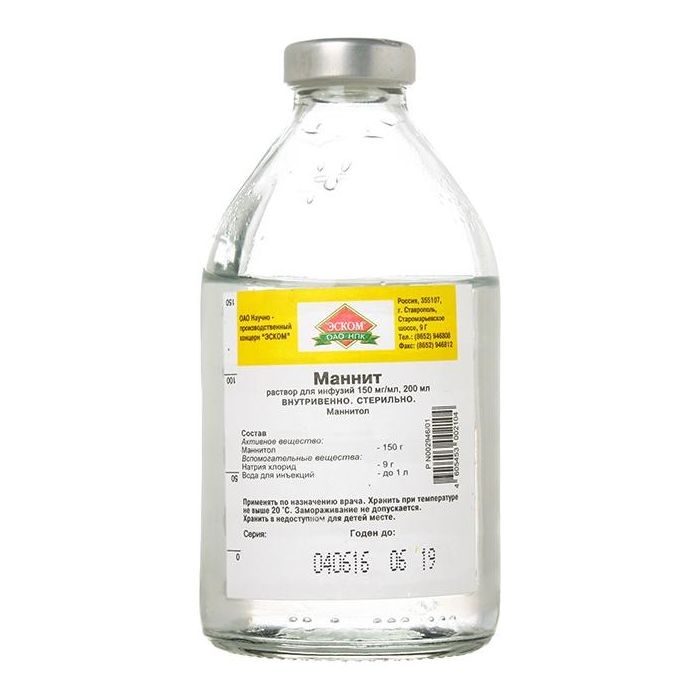mannitol | Mannitol infusion solution 150mg / ml 200 ml bottles 1 pc.
Special Price
$14.70
Regular Price
$22.00
In stock
SKU
BID499973
Latin name
Mannit
Mannit
Latin name
Mannit
Packing
Bottle 200ml.
Pharmacological action
Mannitol - osmotic diuretic. Theoretical osmolarity 1132 mosm / l. By increasing the osmotic pressure of the plasma and filtering without subsequent tubular reabsorption leads to the retention of water in the tubules and an increase in the volume of urine. Increasing the osmolarity of blood plasma, causes the movement of fluid from tissues (in particular, the eyeball, brain) into the vascular bed. Does not affect glomerular filtration. Diuresis is accompanied by a moderate increase in natriuresis without a significant effect on the excretion of potassium ions. The diuretic effect is the higher, the larger the dose.
Not effective for impaired renal filtration, as well as azotemia in patients with cirrhosis and ascites. It causes an increase in the volume of circulating blood.
Indications
cerebral edema
intracranial hypertension (in renal or renal hepatic insufficiency)
oliguria in acute renal or renal hepatic insufficiency with preserved renal filtration ability (as part of combination therapy) after acute reduction of acute postoperative distress poisoning with
barbiturates and salicylates for the prevention of hemolysis in operations with extracorporeal circulation to prevent renal ischemia to and related acute renal failure.
Use during pregnancy and lactation
During pregnancy and lactation, the drug is used only in cases where the intended benefits to the mother outweigh the possible risk to the fetus or baby.
Dosage and administration
Intravenously, slowly, in a stream or drip.
The prophylactic dose is 0.5 g / kg, the therapeutic dose is 1–1, 5 g / kg daily dose should not exceed 140-180 g.
Before administration, the drug should be heated to a temperature of 37 РC (can be in a water bath).
In operations with cardiopulmonary bypass, the drug is injected into the device at a dose of 20–40 g immediately before the start of perfusion.
Patients with oliguria should first administer an intravenous drip test dose (200 mg / kg) for 3-5 minutes. If after this within 2-3 hours there will be no increase in the rate of urine output to 30-50 ml / h, you should refrain from further administration of the drug.
Side effects
Dehydration (dry skin, dyspepsia, myasthenia gravis, cramps, dry mouth, thirst, hallucinations, decreased blood pressure), impaired water-electrolyte metabolism (increased BCC, hyponatremia rarely - hyperkalemia).
Rarely - tachycardia, pain behind the sternum, thrombophlebitis, skin rash.
Drug Interactions
Possible increased toxic effects of cardiac glycosides (associated with hypokalemia).
Storage Conditions
At a temperature not exceeding 20 РC.
Keep out of the reach and sight of children.
Expiration
3 years.
Prescription conditions from
pharmacies Prescription
lekarstvennaja form
Solution for infusion
Mannit
Packing
Bottle 200ml.
Pharmacological action
Mannitol - osmotic diuretic. Theoretical osmolarity 1132 mosm / l. By increasing the osmotic pressure of the plasma and filtering without subsequent tubular reabsorption leads to the retention of water in the tubules and an increase in the volume of urine. Increasing the osmolarity of blood plasma, causes the movement of fluid from tissues (in particular, the eyeball, brain) into the vascular bed. Does not affect glomerular filtration. Diuresis is accompanied by a moderate increase in natriuresis without a significant effect on the excretion of potassium ions. The diuretic effect is the higher, the larger the dose.
Not effective for impaired renal filtration, as well as azotemia in patients with cirrhosis and ascites. It causes an increase in the volume of circulating blood.
Indications
cerebral edema
intracranial hypertension (in renal or renal hepatic insufficiency)
oliguria in acute renal or renal hepatic insufficiency with preserved renal filtration ability (as part of combination therapy) after acute reduction of acute postoperative distress poisoning with
barbiturates and salicylates for the prevention of hemolysis in operations with extracorporeal circulation to prevent renal ischemia to and related acute renal failure.
Use during pregnancy and lactation
During pregnancy and lactation, the drug is used only in cases where the intended benefits to the mother outweigh the possible risk to the fetus or baby.
Dosage and administration
Intravenously, slowly, in a stream or drip.
The prophylactic dose is 0.5 g / kg, the therapeutic dose is 1–1, 5 g / kg daily dose should not exceed 140-180 g.
Before administration, the drug should be heated to a temperature of 37 РC (can be in a water bath).
In operations with cardiopulmonary bypass, the drug is injected into the device at a dose of 20–40 g immediately before the start of perfusion.
Patients with oliguria should first administer an intravenous drip test dose (200 mg / kg) for 3-5 minutes. If after this within 2-3 hours there will be no increase in the rate of urine output to 30-50 ml / h, you should refrain from further administration of the drug.
Side effects
Dehydration (dry skin, dyspepsia, myasthenia gravis, cramps, dry mouth, thirst, hallucinations, decreased blood pressure), impaired water-electrolyte metabolism (increased BCC, hyponatremia rarely - hyperkalemia).
Rarely - tachycardia, pain behind the sternum, thrombophlebitis, skin rash.
Drug Interactions
Possible increased toxic effects of cardiac glycosides (associated with hypokalemia).
Storage Conditions
At a temperature not exceeding 20 РC.
Keep out of the reach and sight of children.
Expiration
3 years.
Prescription conditions from
pharmacies Prescription
lekarstvennaja form
Solution for infusion
Write Your Own Review

